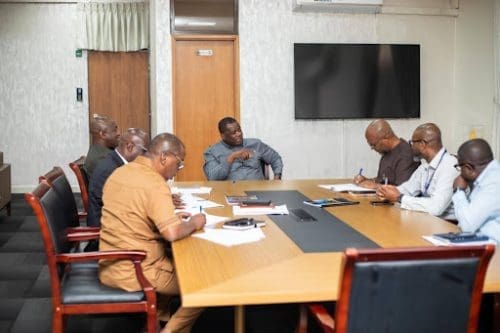Newmont Corporation has signed an agreement with Ghana’s Ministry of Roads and Highways to rehabilitate a critical 46 kilometer highway connecting Sunyani to Akyerensua through Ntotroso. The partnership, formalized through a Memorandum of Understanding on Monday, addresses what residents have described as a deteriorating death trap that’s plagued commuters for months.
The gold mining giant partnered with the government through the Ministry of Roads and Highways to rehabilitate the Sunyani, Ntotronso and Akyerensua road, with contractors already mobilizing to commence work. The project represents the latest in Newmont’s expanding infrastructure footprint across Ghana’s Ahafo region, where the company operates major mining facilities.
Roads Minister Kwame Governs Agbodza joined Newmont representatives at the signing ceremony in Accra. The minister, a chartered architect who was sworn into office in January, has made infrastructure development a priority since taking up his portfolio.
The Sunyani to Ntotroso highway serves as a vital artery linking the Bono and Ahafo regions. Earlier this year, the route was described as a death trap, with the 34 kilometer stretch full of potholes and intense dust that prolonged travel times and created health hazards for commuters. Residents reported increased respiratory diseases and joint pains due to the road’s condition.
Newmont’s involvement in road infrastructure isn’t new. The company allocated $34 million for road construction between 2025 and 2028 in communities around its Ahafo South mine, part of broader efforts to stimulate economic development in host areas. That substantial investment reflects the company’s recognition that functional infrastructure directly supports local commerce and quality of life.
In the Ahafo area specifically, Newmont has funded rehabilitation of several major routes. These include the Ntotroso to Kenyasi road, the Hwediem to Kenyasi road, and internal roads within Ntotroso, Wamahinso, Gyedu, and the Kenyasi communities. The company completed construction of an 8.2 kilometer asphalt road connecting Hwidiem to Kenyasi at a cost of 95.4 million cedis, providing improved access to services and trade across the region.
The mining company’s infrastructure strategy extends beyond just laying asphalt. Company officials emphasize that road networks facilitate transportation of goods and services while stimulating local economic growth. For a corporation whose operations depend on reliable supply chains and community relations, investing in infrastructure makes both social and business sense.
Newmont’s portfolio of community investments spans health, education and development focused initiatives. The company’s foundation has poured significant resources into host communities over the years, recognizing that mining operations create both opportunities and obligations.
The partnership model with government on the Sunyani highway project represents a pragmatic approach to addressing Ghana’s infrastructure deficit. With public budgets stretched thin, private sector participation in road development has become increasingly common. Mining companies, in particular, have strong incentives to ensure reliable transport networks around their operations.
Newmont Corporation ranks as the world’s leading gold company and also produces copper, zinc, lead and silver. The company’s portfolio spans favorable mining jurisdictions across Africa, Australia, Latin America, the Caribbean, North America and Papua New Guinea. As the only gold producer listed in the S&P 500 Index, Newmont maintains high visibility among investors who increasingly scrutinize environmental, social and governance practices.
That scrutiny has pushed mining companies to demonstrate tangible community benefits beyond just employment and tax revenues. Infrastructure investments offer visible, lasting contributions that can help secure social license to operate. When local residents see improved roads, schools and health facilities, they’re more likely to view mining operations favorably.
The timing of the highway rehabilitation project aligns with Ghana’s broader push to upgrade national infrastructure. President John Mahama’s administration has launched the Big Push initiative, comprising 42 road projects nationwide aimed at modernizing transport networks and creating jobs. Private sector partnerships like the Newmont agreement complement government efforts by mobilizing additional resources and expertise.
For communities along the Sunyani to Akyerensua route, the rehabilitation can’t come soon enough. Poor road conditions don’t just inconvenience travelers; they impose real economic costs. Damaged vehicles, delayed shipments, increased transport prices and lost productivity all flow from deteriorating infrastructure. Health impacts from dust and accidents add another layer of harm.
The rehabilitation work will likely take months to complete, depending on weather conditions and contractor efficiency. During construction, commuters may face temporary disruptions, though the end result should dramatically improve travel conditions and safety.
Newmont’s commitment to the project reflects the company’s stated purpose of creating value and improving lives through sustainable and responsible mining. Whether motivated by genuine corporate citizenship, calculated business strategy, or both, the infrastructure investments deliver tangible benefits to host communities.
As Ghana continues attracting mining investment, the expectation that companies contribute to local development has become standard. The Newmont road partnership provides a template for how private resources can complement government infrastructure programs, addressing critical needs while supporting the business environment that mining operations require.
The company was founded in 1921 and has been publicly traded since 1925, giving it nearly a century of experience navigating community relations and corporate responsibility expectations. That long history has taught Newmont that investing in host communities isn’t just philanthropy; it’s essential business practice.
Source: newsghana.com.gh











